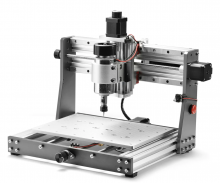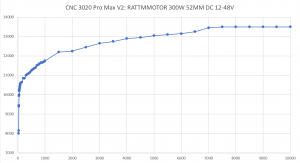CNC 3020 Pro Max: Difference between revisions
Spacezhang (talk | contribs) No edit summary |
Spacezhang (talk | contribs) |
||
| Line 26: | Line 26: | ||
== Software Setup & Introduction == | == Software Setup & Introduction == | ||
===<div id="Software">Software</div>=== | ===<div id="Software">Software</div>=== | ||
For Windows users, the [https://github.com/Denvi/Candle GRBL Candle software] is a good choice for controlling and sending GCode to the machines. It is technically also usable on linux and mac, but it is untested. | For Windows users, the [https://github.com/Denvi/Candle GRBL Candle software] is a good choice for controlling and sending GCode to the machines. It is technically also usable on linux and mac, but it is untested. | ||
| Line 67: | Line 68: | ||
===== Test Gcode===== | ===== Test Gcode===== | ||
[Detail comming soon] | [Detail comming soon] | ||
== Maintanence == | == Maintanence == | ||
[Detail comming soon] | [Detail comming soon] | ||
Revision as of 19:06, 8 February 2024
 Warning: Beware of the dangers of CNC machines! Use at your own risk and only if you know what exactly you are doing!
Warning: Beware of the dangers of CNC machines! Use at your own risk and only if you know what exactly you are doing!  To use this machine the "CNC beginner training" workshop is mandatory!
To use this machine the "CNC beginner training" workshop is mandatory!| CNC 3020 Pro Max Release status: experimental [box doku] | |
|---|---|

| |
| Description | Milling/Engraving Machine |
| Author(s) | Yichen Zhang (Spacezhang) |
General Introduction
A small but full-featured cnc running GRBL donated to the lab for use, brought to you and maintained by Yichen.
What is the CNC 3020 Pro Max V2?
The CNC 3020 Pro Max V2 is a generic engraving machine. This machine can be used to cut anything from wood to aluminium and is very good for getting started and learn how to use a CNC machine and how It works.
Course Material
Presentation:
Software Setup & Introduction
Software
For Windows users, the GRBL Candle software is a good choice for controlling and sending GCode to the machines. It is technically also usable on linux and mac, but it is untested.
Mac: For newer version of mac GRBL Candel might not work due to some newer mac features. Instead, the universalgcodesender or the openbuilds Gcode Sender could be used.
Driver should be CH340.
There is also a offline Gcode Sender avaliable for use where Gcode can be loaded onto the SD Card and send to the machine
Working windows software bundle for controlling the machine and for PCB Milling:
https://drive.google.com/drive/folders/1bQ-ewmTWgRL_v9L2HsZoTOGtxflSw3Ma?usp=sharing
- This is Preferred if you are using Windows as we can guarantee it works. Windows Driver also Included
Some Gcode Sender options:
universal gcode sender [Free, Open Source, WIN/MAC/LINUX](Tested with Mac)
bCNC [Free, Open Source, WIN/MAC/LINUX]
Openbuilds Control [Free, Open Source, WIN/MAC/LINUX]
CAM Options
Carbide Create V6 Software for 2D Routing [Free, Tested, Recommended, WIN/MAC] (Use version V6 as later version requires subscription):
Openbuilds opencam [Free, Tested, Web-Based or Local, WIN/MAC/LINUX]
https://cam.openbuilds.com/
Fusion 360 CAM for proper 3D Routing [Free*, Tested, Recommended]
- (More advanced and requires more time to learn, but very powerful and is a requirement for the big CNC)
- https://www.autodesk.com/products/fusion-360/personal
A new web based free 3D CAM option! Kiri:Moto (Still TBT)
Tutorial comming soon, till then please search on youtube or ask for instructions on slack
Wood Engraving / Milling
[Detail comming soon]
PCB Engraving
[Detail comming soon]
Acrylic Engraving / Milling
[Detail comming soon]
Test Gcode
[Detail comming soon]
Maintanence
[Detail comming soon]
Material settings
- For now, please use the rough estimate till we figure the value out for each bit!
- 3.175mm Bits:
- MDF & Softwood: 3.175mm single flute no nore then 400mm/min, 2mm single flute no more then 300 mm/min, double flute double the Feedrate
- Acrylic: 3.175mm single flute no nore then 300mm/min, 2mm single flute no more then 200 mm/min, double flute double the Feedrate
- Aluminium: 2mm double flute 20mm / min, plundge rate 20mm / min(More testing need to be done)
Spindle speed: 10000 (Not actually at this speed, but for controller)
Plundge rate: 200mm / min to 400 mm / min
Pass depth: half the bit cutting size
- Engraving Acrylic: Use 25deg Vbit spiral cutter,
- Feedrate: 300/min, Plundge rate: 200mm/min, cutting depth: 0.3mm
Acceptable work piece materials
Engrave/ Cut
- MDF / HDF
- Softwood, Hardwood, Plywood
- Acrylic
- PCB
- Aluminium, Brass & More
Technical Documentations
The Machine:
Spindle currently in use:
Official Resource Page from Saintsmart:
Specifications
Mechanical Specifications
- Type: Milling / Engraving machine
- Machine dimensions: 484 x 394 x 388mm (19.04” x 15.49” x 15.28”)
- Working area: 300 x 205 x 78 mm (11.81″ x 8.07″ x 3.07″)
- Max Speed: 2000mm / min
- Frame: Extruded Aluminum, All Metal
- Motion: NEMA 17, 47mm Stepper motors
- Stepper Driver: TB67S109
- Power Supply: 48V 8.3A
- Running / Reposition Accuracy: <= +- 0.1mm
- Materials: Woods, Plastics, PVCs, soft aluminum (6061), Nylon, Acrylic, PCBs
Spindle
- Motor: 300W 52MM DC 12-48V CNC Spindel Air cooled 12000U/min
- Cooling Fan: Internal
- Overall Size: 20,5 x 6,8 x 6,8 cm; 867 Gramm
- Collets: ER 11
- Actual measured Spindle Speed (Without Load): 13500 U/min

Routing Bits
- Currently mostly 3.175 mm (1/8 Inch) Bits Available
- V Bits 20 / 30 / 40 / 60 degree
- Multifunctional cutting bits 0.8 – 3.175 mm
- Single flute upward cutting bits 3.175mm, 2mm
- 3.175mm Ball end double flute bits
- More are comming
Controll Board
- Genmitsu custome control board
- Running GRBL 1.1f ARM32
- Interface Compatibility: Windows, Mac OS, Linux
- Height Probe, Hand Wheel & Air control connection
- Up to 4A Laser connection avaliable
Current GRBL Settings
$0=10 (step pulse,usec) $1=25 (step idle delay,msec) $2=0 (stepport invert mask) $3=2 (dirport invert mask) $4=0 (stepenable invert,bool) $5=1 (lims pin invert,bool) $6=1 (probe pin invert,bool) $10=1 (status report mask) $11=0.010 (junction deviation) $12=0.002 (arc tolerance,mm) $13=0 (report inches,bool) $20=0 (soft limits,bool) $21=1 (hard limits,bool) $22=1 (home cycle,bool) $23=3 (homing dir invert mask) $24=100.000 (homing feed,mm/min) $25=500.000 (homing seek,mm/min) $26=250 (homing debounce,msec) $27=2.000 (homing pull-off,mm) $30=10000 (maximum spindle speed,rpm) $31=0 (minimum spindle speed,rpm) $32=0 (laser mode enable,bool) $100=800.000 (x axis pulse:step/mm) $101=800.000 (y axis pulse:step/mm) $102=800.000 (z axis pulse:step/mm) $110=2000.000 (x axis max rata:mm/min) $111=2000.000 (y axis max rata:mm/min) $112=2000.000 (z axis max rata:mm/min) $120=50.000 (x axis acceleration:mm/s^2) $121=50.000 (y axis acceleration:mm/s^2) $122=50.000 (z axis acceleration:mm/s^2) $130=300.000 (x aixs max travel:mm) $131=200.000 (y aixs max travel:mm) $132=80.000 (z aixs max travel:mm) ok
Change Log
Note: Aiming for Middle 2024 to finish the documentation. Till that time, if you have any questions in regards of this machine, please contact @spacezhang on slack.
- 16.11.2023: Machine has been assembles and brought to the lab.
- 11.12.2023: Wiki Page has been created
- 27.12.2023: New Spindle Arrived, runout improved from 0.11 to 0.03, Spindle Speed manually measured
- 25.01.2024: New Eurobox container has arrived and the machine is now on the bottom shelve in the workshop! (As discussed in Plenum)
<\br> Also: We have more new bits for use!
Feedback and suggestions
If you have any feedback, request or suggestions in regard to this project and wiki page, please feel free to contach me or simply edit this section of wiki.
